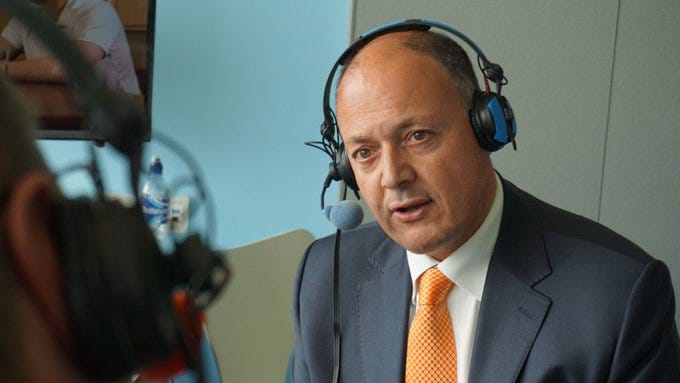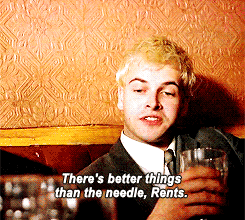More Chelsea, said nobody; The Big Eventer Trap pt2; The misreading of Mateschitz; Why Ireland is good at cricket; Woke and broke; The Unofficial Partner effect; Trump hearts LIV's money, who knew
Welcome to the sports business conversation
The best sports executive you’ve never heard of
Why is Ireland so good at cricket?
Tiny participation base; losing their best players to England; scrambling to make ends meet from one season to another.
It shouldn’t work.
But it does, often despite the ICC rather than because of it.
So three cheers for the work of Warren Deutrom, CEO of Cricket Ireland since 2006.
I first met Warren while cricket correspondent of The Irish Times for a few wild years in the mid-00s.
He came from the ICC via ECB, and the locals couldn’t quite believe their luck.
He brought vision, nous and instilled a culture of realistic ambition.
And not many sport CEOs bail out their own organisation, but that’s what Deutrom did in the face of (another) funding crisis in 2019.
"We were seriously struggling," Deutrom told ESPNcricinfo. "The loan was my wife's idea. She said, 'I can see how much you believe in this and if you do, I do.' So I wrote to our bank and triggered the seven-day notice period on our savings account that switched it to our current account.
"At that stage, I was still hoping one of our lifeboats would come to the rescue. But when none of them did, we made the loan."
He charged no interest and the loan was repaid in about six weeks. It was properly documented and cleared by CI's lawyers, and the ICC have since confirmed they were comfortable with the arrangement. Sport Ireland, it might be noted, advised against it.
‘I heard you on Unofficial Partner’, the most powerful sentence in sports marketing
Maggie Murphy of Lewes FC credits her appearance on UP138 for the club’s big new sponsorship deal with Xero.
And this week, news came from Sarah Batters, Saints’ marketing and commercial supremo (and recent UP guest), that Southampton FC Women had landed Starling Bank as a new partner.
I suppose it might be coincidence.
Congratulations all.
7 nuggets buried in Twitter’s leaked audience report
The headline was that ‘heavy tweeters are in absolute decline’.
Not great news for Elon Musk.
But there were some devilish details for those running sport.
Avidity doesn’t mean what you think it means
Twitter’s internal documents reveal how it defines avidity.
A heavy tweeter is someone who tweets just three or four times a week.
Pareto knew his shit
Heavy tweeters account for less than 10% of monthly overall users but generate 90% of all tweets and half of global revenue.
Heavy Tweeters sound like Coke drinkers
A typical Coke customer buys Coke twice a year. But at scale, tiny increases in purchase frequency has a big impact on total sales.
This, from Byron Sharp’s work on mental availability in advertising.
You, for instance, may not think of yourself as a Coke buyer, but if you’ve bought it once in the last 12 months, you’re actually a typical Coke consumer. This pattern recurs across brands, categories, countries and time. Whether it’s toothpaste or computers, French cars or Australian banks, brands depend on large numbers of people — that’s to say, the masses — who buy them only occasionally, leave long gaps between purchases and buy competing brands in between.
Sounds like my relationship with rugby and tennis tbh.
Fan loyalty might just be a story we tell ourselves.
Sports marketing likes to use marketing models to frame the sport-fan relationship. It does this because it’s easy, and gives good infographics.
But I’m coming to suspect it misrepresents the real relationship beyond the heavily tribal outliers of European football and US major leagues.
I think this is particularly true around the issue of fan loyalty, which looks more like anthropomorphism the closer you get to it.
Heavy Tweeters, Coke Drinkers and…Big Eventers.
By putting Big Eventers at the centre of strategy, many sports rights holders have spent the last decade chasing ghosts, or more accurately, people who don’t care about them, beyond a tiny number of engagement points.
(See: previous note on The Big Eventer Trap)
This gives the gist:
The rise of the Big Eventer has changed the focus from the sport to the fan experience.
This means that the most important factor determining the success or failure of an event is the totality of the occasion. That is the new competitive landscape. The winners of this game will be those rights-holders that can afford to keep their offer ahead of expectations.
But pleasing Big Eventers demands the sort of money beyond the day-to-day balance sheet of most rights-holders. They can’t afford it without outside funds, so they end up in bed with venture capital of all colours and stripes.
That’s when the fun really starts.
Btw, sport needs to wean itself off Twitter numbers
Is the internet a mirror or an enabler?
Are we born dirty, or does social media make us dirty?
Either way, Twitter’s getting grubbier:
Cryptocurrency and "not safe for work" (NSFW) content, which includes nudity and pornography, are the highest-growing topics of interest among English-speaking heavy users, the report found.
At the same time, interest in news, sports and entertainment is waning among those users. Tweets on those topics, which have helped Twitter burnish an image as the world’s "digital town square," as Musk once called it, are also the most desirable for advertisers.
For global, read American
By your revenue sources shall you be judged (a pretentious way of saying, follow the money).
Twitter earned more ad revenue from the United States alone than all other markets combined in its fourth quarter.
See also Netflix.
Different but related: Who is betting on sport? Sports fans, or someone else?

The misreading of Dieter Mateschitz
We’re planning a podcast on the sports business legacy of the Red Bull founder.
Get in touch if you knew him.
Read this obit in the NYT for detail of the man and the life.
His sports business legacy is profound.
And like all great ideas, Red Bull’s strategy has many imitators: content marketing; in-house media; brand as IP owner.
But here’s the thing: Specificity.
It worked FOR RED BULL.
Whereas most brand content is shit.
Tedious, space filling, self serving shit.
Woke is Broke v The Good Sponsor Myth
This is a build on a previous note - What’s the point of British Cycling?
Australia is having a very interesting conversation about sponsorship, greenwashing and the implications of player power.
This piece by Peter Baulderstone is asking some really good questions.
Some high profile sports stars have used their platform to complain about sources of funding to which governing bodies have responded by cancelling lucrative sponsor contracts.
Australian netballer Donnell Wallam v Hancock Mining. “The sponsor withdrew their $15M in sponsorship over four years at a time when Australian netball could least afford it. The sport is already $7M in debt and replacement sponsors of this size don’t grow on trees”.
Australian cricket captain Pat Cummins v Alinta Energy. Cricket Australia have dropped its $40M four year sponsorship deal with Alinta.
Fremantle Dockers supporters led by ex-Premier Carmen Lawrence and ex-player Dale Kickett v Woodside Energy. To date the club has stood firm on its $2M per annum sponsorship contract.
But athlete activism can be a blunt instrument, designed for culture war.
We’re might need a more nuanced conversation, says Baulderstone.
Baulderstone: Rugby Union star turned Senator David Pocock has supported all of these initiatives – simplistically likening energy industries to tobacco products – that should be banned for their harmful properties.
Tobacco use is discretionary. Energy use is not, if modern living standards are to be sustained.
My sense is that player power has aligned with cancel culture and that much of the concern is either wrong-headed or disproportionate.
Read the whole thing. It’s good.
Haven't we suffered enough. AKA, are Chelsea going multi club?
The ‘globally’ reference in this tweet has done some heavy lifting this week, leading some to suggest Chelsea are about to go the City Football Group route.

One of our best ever performing podcasts was with Paul Conway, CEO of Pacific Media Group, a pioneer of multi club ownership across European lower league football.
Even Conway admits that when it comes to the pros and cons, there are more questions than answers:
Is City a good proof of concept for other clubs, given its enormous funding advantage?
Can a club extend a playing style across a network of clubs - aka the DNA argument?
The commercial rationale is about centralisation: Of back office, marketing, sponsorship sales, CRM, content, performance data etc etc.
The performance argument is harder, and feels like an overstretch: can every club play in the group really play in the same style, with players and managers fitting in to an overarching system?
Jump to: Does a club have a performance DNA, that can run both vertically - youth team to first team - AND horizontal, club to club across the group.
Or is it just a way of putting greater control in the hands of the ownership rather than the manager, reducing the impact of coach sackings and the inevitable culture switching that comes with it?
“As a coder, he was in the Shane Warne or Brian Lara league”
Lovely piece on Travis Basevi, a sports data pioneer, gone far too soon.
Travis was an integral part of getting Cricinfo’s scorecards database together, a process that was painstaking, elaborate, time-consuming and a labour of love as he did for free as a volunteer.
Later, he singlehandedly built StatsGuru, the engine without which cricket journalists would struggle and fans lost as to settling debates. StatsGuru is something of a miracle and largely unparalleled in any other website or any other sport even for that matter.










It was a strange thing that happened yesterday. We did a podcast recording with Alex Balfour about Cricinfo and he mentioned Travis, and then an hour later I was looking for something completely unrelated and stumbled across it. trust all's well, don't you miss old Twitter...
Thanks for the mention of Travis. He was a lovely man and a good friend and his funeral bought together a whole bunch of interesting tribes of his friendship groups, most of whom had never interacted. The cricinfo bunch, touch rugby team and a whole load of QPR fans.
In classic bloke mode, he kept different bits of his life completely separate. It took us about five years of friendship before I could even get him to talk about cricket.
There's still a big Travis shaped hole in a lot of lives.